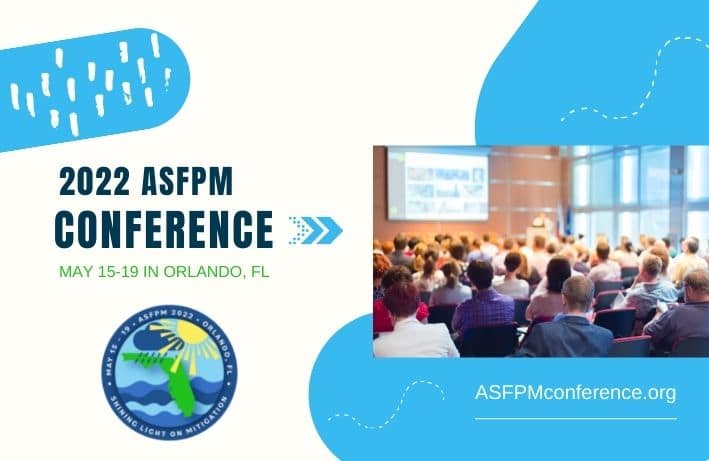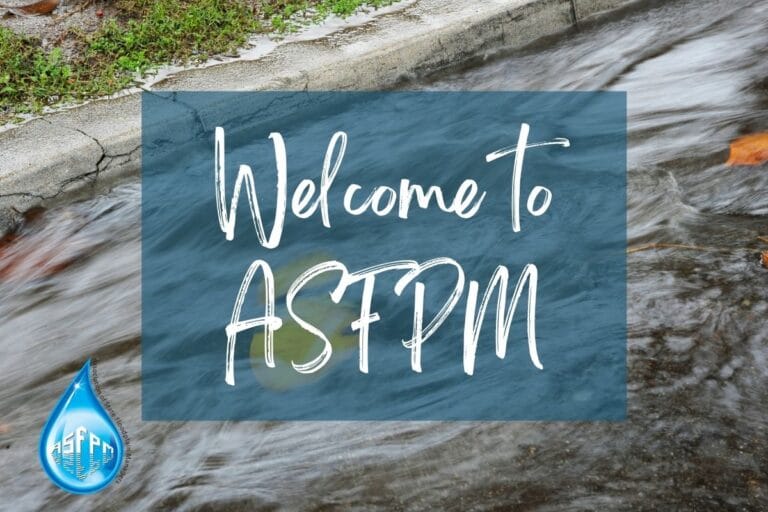ASFPM-led Sessions: Hear from Staff on Key Programs and Projects

One of the things we love most about ASFPM’s annual conference is the opportunity to hear directly from our members as they share their experiences, challenges, best practices, and lessons learned. The conference is also the perfect time for members to learn more details about what the association has been up to since we were last together.
To help you plan your schedule, this post lists all the sessions led by ASFPM staff members as well as those that highlight an ASFPM initiative.
SESSION LIST
Monday, May 16 8:00am-10:00am
Workshop – Ethics for Floodplain Managers and Planners
Monday, May 16 1:00-3:00pm
Workshop – Planning for Disaster: Creating an SDE Operations Plan that Leverages Mutual Aid & DRRA 1206 Funding
Tuesday, May 17 2:30-4:30pm
Workshop – Flood Insurance for State Floodplain Managers: An ASFPM Mentoring One-on-one Module
Wednesday, May 18 10:30am-Noon,
Session D5, Hold ‘em or fold ‘em: Decision-making tools and resources for flood mitigation
Wednesday, May 18 10:30am-Noon,
Session D2, Flood Mitigation Certification Program Spotlight
Thursday, May 19
2:00-3:30pm, Session H1:
- What Keeps You Up at Night? Using NAI to Keep Your Community Out of Court
- Making the legal case for a NAI approach to floodplain stewardship in an era of climate change
- Constitutional Law and Property Protections in Floodplain Management
Thursday, May 19 4:00-5:30pm
Session J8: The Official Guide to Taking the CFM Exam and Maintaining Your Certification
FULL DESCRIPTIONS
Ethics for Floodplain Managers and Planners
Workshop: Monday, May 16 at 8:00 am
Presenters: Louie Greenwell, GISP, CFM – ASFPM and Jacob Hoover, AICP, CFM – Ohio EMA
Abstract: Many professions have mandatory ethics training requirements for their licensed professionals. In an effort to offer ethics training for floodplain managers, ASFPM’s Professional Development Committee (PDC) has designed this workshop to promote ethical behaviors and enhance our profession. The workshop will review ethical issues often encountered in the floodplain management profession and will be applicable to engineers, floodplain managers, surveyors, planners, and others involved in the floodplain management profession. The course will explain and review both the Certified Floodplain Manager (CFM) Code of Ethics and the AICP Code of Ethics and Professional Conduct. Participants will: (1) Understand the importance of having a professional Code of Ethics as a floodplain manager. (2) Understand how ethics impact the day to day activities of floodplain managers and planners. (3) Recognize situations that could cause ethical dilemmas to arise. (4) Consider ethical situations from multiple perspectives (i.e. engineer, planner, developer, realtor, homeowner). (5) Utilize best practices to avoid and navigate various ethical dilemmas as well as tips to maintain professional integrity.
Planning For Disaster: Creating an SDE Operations Plan that Leverages Mutual Aid & DRRA 1206 Funding
Workshop: Monday, May 16 at 1:00 pm
Instructors: Shandy Heil, Paul Osman, CFM and Nic LeBlanc, CBO, CFM
Abstract: This workshop will provide students with an understanding of the processes and actions involved with planning post-disaster floodplain administration and code enforcement tasks, including Substantial Damage Estimates. The ASFPM Disaster Assistance Response Team (DART) Playbook and mutual aid initiative will be discussed, to shed light on alternative options to satisfy post-disaster requirements. Mutual aid agreement types and legislation will be explained to help students understand the formalities of utilizing mutual aid assistance. A case study of the Louisiana Floodplain Management Association (LFMA) Disaster Response Team’s response, during Hurricane Ida, will provide boots on the ground perspective and methodology, to help local officials understand how to create a disaster operations plan for their own community. Upon completion of the course, participants will be able to: (1) Realize current mutual aid options for post-disaster floodplain administration and code enforcement duties, (2) Understand components and steps in creating a post-disaster operations plan, (3) Recall how to utilize DRRA 1206, PA Cat G funding, for post-disaster floodplain administration and code enforcement tasks.
Flood Insurance for State Floodplain Managers: An ASFPM Mentoring One-on-one Module
Workshop: Tuesday, May 17 at 2:30 pm
Presenters: Bill Nechamen, CFM and Ceil Strauss, CFM
Abstract: The ASFPM Mentoring Program One-on-One modules address key topics for state floodplain management professionals. This module focuses on flood insurance and delves into: how to access and read the community status book, how to dispute a flood zone determination, what you need to know about Letters of Map Change (LOMC), how to talk about mitigation, offices with whom to coordinate, key data systems, and more. Risk Rating 2.0 will not be ignored but the focus of the workshop will be on the lasting aspects of flood insurance around which tried-and-true experiences can be shared and useful conversations can be had.
Hold ‘Em or Fold ‘Em: Decision-making Tools and Resources for Flood Mitigation
Session D5: Risk Communication, Wednesday, May 18 at 10:30 am
Presenters: Jenna Moran and Eleanor Rappolee
Abstract: Does your community have property owners looking for information and guidance on mitigation options when rebuilding after a flood? Property buyers thinking of purchasing a home in a flood prone area and wondering about mitigation options? Is your community in need of guidance around how to address repetitive flood loss properties? ASFPM has two new tools which can help. Reduce Flood Risk: A Library of Flood Mitigation Strategies and Resources is a tool to help property owners in flood prone areas understand what flood mitigation actions they can take today to protect their homes, businesses, and neighborhoods from future flooding; and the Community Resilience Guide for Repetitive Flood Loss is a tool to provide technical guidance and training to local floodplain managers on effective strategies for mitigating repetitive flooding. This presentation will demo these two tools. For ReduceFloodRisk.org, it will also focus on how local and state government staff can share this tool and its associated resources with property owners. For the Community Resilience Guide for Repetitive Flood Loss, it will also highlight common challenges related to repetitive flooding that communities face and showcase some of the guidance, resources, and training that have been developed and compiled to help local floodplain managers take on those challenges.
Flood Mitigation Certification Program Spotlight
Session D2: Floodproofing and Retrofitting: Wednesday at 10:30 am
Presenters: Louie Greenwell, GISP, CFM – ASFPM and Charles Mahall – FM Approvals
Abstract: Are you a community official that is planning a local flood protection project? Maybe you are a property owner or lender with a significant investment that you need to protect? With all the flood mitigation products in the marketplace, how can you be sure which ones will perform as advertised? Can you afford to take the risk of a valve, seal or enclosure failing during a flood? The Flood Mitigation Certification Program is a partnership between ASFPM, the USACE, and FM Approvals that independently and objectively tests and certifies various flood mitigation products against the ANSI/FM 2510 standard of performance. Attendees will learn about the program, types of certified products, the standard, the testing/certification process, and the benefits to manufacturers and the public.
What Keeps You Up at Night? Using NAI to Keep Your Community Out of Court
Session H1: No Adverse Impact Legal Guide: A Resource for Floodplain Managers: Thursday at 2:00 pm
Presenters: Terri Turner, AICP, CFM; and Janet Thigpen, CFM
Abstract: Since 2013, ASFPM and the ASFPM Foundation have invested significantly in the development of No Adverse Impact (NAI) How-To Guides. Development of the Guides was encouraged by ASFPM members who read ASFPM’s popular publication, the NAI Toolkit, which gave examples of NAI techniques, but didn’t explain how to implement them. The Toolkit identified seven “building blocks” or areas of community involvement that can have an impact on successful NAI: 1) Hazard Identification and Floodplain Mapping; 2) Education and Outreach; 3) Planning; 4) Regulations and Development Standards: 5) Mitigation; 6) Infrastructure; and 7) Emergency Services. The entire How-To Guide series is available for download on ASFPM’s Information Resource Center website. In 2020, the ASFPM Board of Directors approved funding for the Legal Guide to Flood Risk Management, which is essentially the 8th Guide for the series. The Legal Guide is being written for community attorneys and will include descriptive narrative for floodplain managers. This presentation will provide an overview of the NAI How-To Guide series and take a deeper dive into the How-To Guide for Planning. The session will then make the connection between the current How-To Guides and the need for the legal guide and show participants how to access all of the guides.
Making the Legal Case for a NAI Approach to Floodplain Stewardship in an Era of Climate Change
Session H1: No Adverse Impact Legal Guide: A Resource for Floodplain Managers: Thursday at 2:00 pm
Presenters: Jerry Murphy, JD, AICP, CFM
Abstract: NAI is a principle that leads to a process that is beneficial, legally acceptable, palatable, and understandable to the community as a whole. Courts have broadly and consistently upheld performance-oriented floodplain regulations including those that exceed minimum FEMA NFIP standards. Regulations that require additional freeboard, establish setbacks, impose tighter floodway restrictions, or very tightly regulate high risk areas have consistently been upheld by the courts. This presentation will give participants an overview of the common law, constitutional law, and legal foundation of the NAI approach to floodplain management. It will also provide an introduction to the forthcoming Legal Guide to Flood Risk Management and its organization as a tool for floodplain stewards and their legal representatives.
Constitutional Law and Property Protections in Floodplain Management
Session H1: No Adverse Impact Legal Guide: A Resource for Floodplain Managers: Thursday at 2:00 pm
Presenters: Thomas Ruppert, Esquire; and Emma Campbell, JD
Abstract: Property law, long acknowledged as a changing, state-determined area of law subject to significant legislative modification to account for changing circumstances has, in the last few decades, become increasingly defined by the U.S. Supreme Court through interpretations of the U.S. Constitution’s Fifth Amendment property rights protections. This presentation will begin with an historical review of cases and statements of the law that have been ignored or forgotten over time but whose salience is brought into stark relief by the dramatic changes to flooding and other environmental factors due to the confluence of factors such as climate change, sea-level rise, and ever-increasing development in formerly undeveloped areas. The presentation will then examine whether and how much validity these ignored or forgotten rules might have in light of more recent case law, and end with observations about how modern floodplain management can integrate lessons from the past and push the law to evolve to effectively confront our changing circumstances.
ASFPM Spotlight: The Official Guide to Taking the CFM Exam and Maintaining Your Certification
Session J8: Professional Development: Thursday at 4:00 pm
Presenter: Louie Greenwell, GISP, CFM – ASFPM
Abstract: So your boss just told you that your community is required to have a Certified Floodplain Manager (CFM), and that person is now you! Maybe earning your CFM credential was in your employee performance goals and you need to pass the exam in the next few months or you won’t get that big promotion with the corner office. Whatever the reason, you probably have lots of questions as you begin to prepare. How many questions and what subject matter is on the exam? Where can you find study resources? Where can you take the exam? How much does it cost? What can you bring with you on exam day? How long does it take to get your results? How long do you have to wait to take it again if you don’t pass? How do you sign up? We’ll answer all of these questions and more including the requirements for maintaining your certification. How many continuing education credits (CECs) do you need and how often? What qualifies and what doesn’t? What proof do you need to submit? Where can you find free or low-cost CECs? All will be revealed!
View the full conference program.


